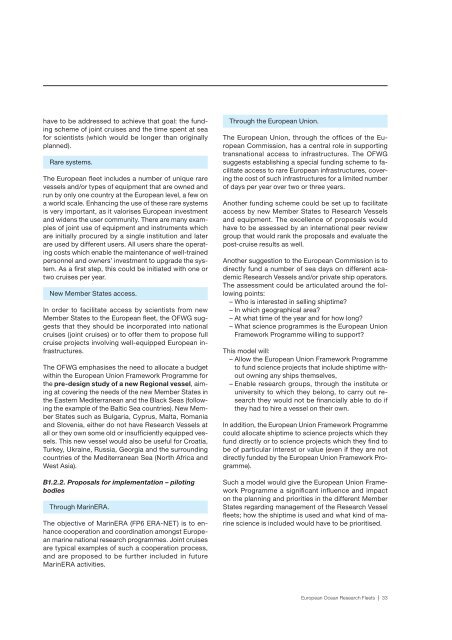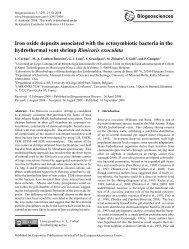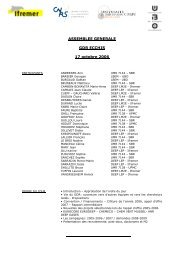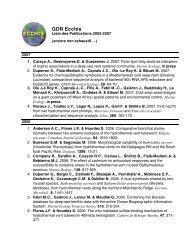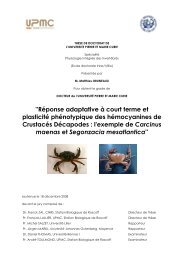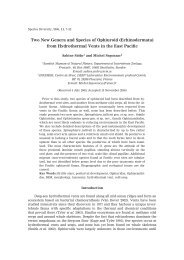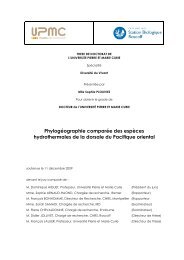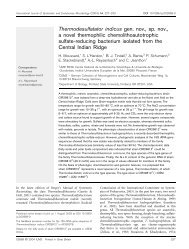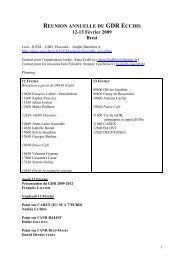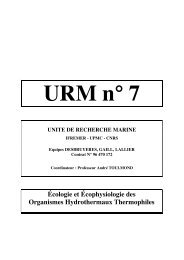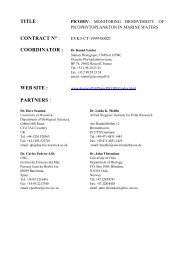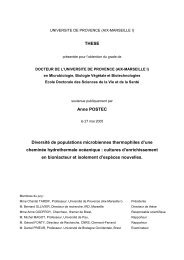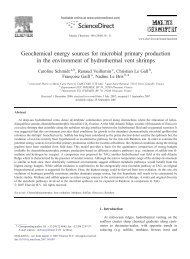European Ocean Research Fleets - uefiscdi
European Ocean Research Fleets - uefiscdi
European Ocean Research Fleets - uefiscdi
You also want an ePaper? Increase the reach of your titles
YUMPU automatically turns print PDFs into web optimized ePapers that Google loves.
have to be addressed to achieve that goal: the funding<br />
scheme of joint cruises and the time spent at sea<br />
for scientists (which would be longer than originally<br />
planned).<br />
Rare systems.<br />
The <strong>European</strong> fl eet includes a number of unique rare<br />
vessels and/or types of equipment that are owned and<br />
run by only one country at the <strong>European</strong> level, a few on<br />
a world scale. Enhancing the use of these rare systems<br />
is very important, as it valorises <strong>European</strong> investment<br />
and widens the user community. There are many examples<br />
of joint use of equipment and instruments which<br />
are initially procured by a single institution and later<br />
are used by different users. All users share the operating<br />
costs which enable the maintenance of well-trained<br />
personnel and owners’ investment to upgrade the system.<br />
As a first step, this could be initiated with one or<br />
two cruises per year.<br />
New Member States access.<br />
In order to facilitate access by scientists from new<br />
Member States to the <strong>European</strong> fleet, the OFWG suggests<br />
that they should be incorporated into national<br />
cruises (joint cruises) or to offer them to propose full<br />
cruise projects involving well-equipped <strong>European</strong> infrastructures.<br />
The OFWG emphasises the need to allocate a budget<br />
within the <strong>European</strong> Union Framework Programme for<br />
the pre-design study of a new Regional vessel, aiming<br />
at covering the needs of the new Member States in<br />
the Eastern Mediterranean and the Black Seas (following<br />
the example of the Baltic Sea countries). New Member<br />
States such as Bulgaria, Cyprus, Malta, Romania<br />
and Slovenia, either do not have <strong>Research</strong> Vessels at<br />
all or they own some old or insufficiently equipped vessels.<br />
This new vessel would also be useful for Croatia,<br />
Turkey, Ukraine, Russia, Georgia and the surrounding<br />
countries of the Mediterranean Sea (North Africa and<br />
West Asia).<br />
B1.2.2. Proposals for implementation – piloting<br />
bodies<br />
Through MarinERA.<br />
The objective of MarinERA (FP6 ERA-NET) is to enhance<br />
cooperation and coordination amongst <strong>European</strong><br />
marine national research programmes. Joint cruises<br />
are typical examples of such a cooperation process,<br />
and are proposed to be further included in future<br />
MarinERA activities.<br />
Through the <strong>European</strong> Union.<br />
The <strong>European</strong> Union, through the offi ces of the <strong>European</strong><br />
Commission, has a central role in supporting<br />
transnational access to infrastructures. The OFWG<br />
suggests establishing a special funding scheme to facilitate<br />
access to rare <strong>European</strong> infrastructures, covering<br />
the cost of such infrastructures for a limited number<br />
of days per year over two or three years.<br />
Another funding scheme could be set up to facilitate<br />
access by new Member States to <strong>Research</strong> Vessels<br />
and equipment. The excellence of proposals would<br />
have to be assessed by an international peer review<br />
group that would rank the proposals and evaluate the<br />
post-cruise results as well.<br />
Another suggestion to the <strong>European</strong> Commission is to<br />
directly fund a number of sea days on different academic<br />
<strong>Research</strong> Vessels and/or private ship operators.<br />
The assessment could be articulated around the following<br />
points:<br />
– Who is interested in selling shiptime?<br />
– In which geographical area?<br />
– At what time of the year and for how long?<br />
– What science programmes is the <strong>European</strong> Union<br />
Framework Programme willing to support?<br />
This model will:<br />
– Allow the <strong>European</strong> Union Framework Programme<br />
to fund science projects that include shiptime without<br />
owning any ships themselves,<br />
– Enable research groups, through the institute or<br />
university to which they belong, to carry out research<br />
they would not be fi nancially able to do if<br />
they had to hire a vessel on their own.<br />
In addition, the <strong>European</strong> Union Framework Programme<br />
could allocate shiptime to science projects which they<br />
fund directly or to science projects which they fi nd to<br />
be of particular interest or value (even if they are not<br />
directly funded by the <strong>European</strong> Union Framework Programme).<br />
Such a model would give the <strong>European</strong> Union Framework<br />
Programme a signifi cant infl uence and impact<br />
on the planning and priorities in the different Member<br />
States regarding management of the <strong>Research</strong> Vessel<br />
fleets; how the shiptime is used and what kind of marine<br />
science is included would have to be prioritised.<br />
<strong>European</strong> <strong>Ocean</strong> <strong>Research</strong> <strong>Fleets</strong> | 33


